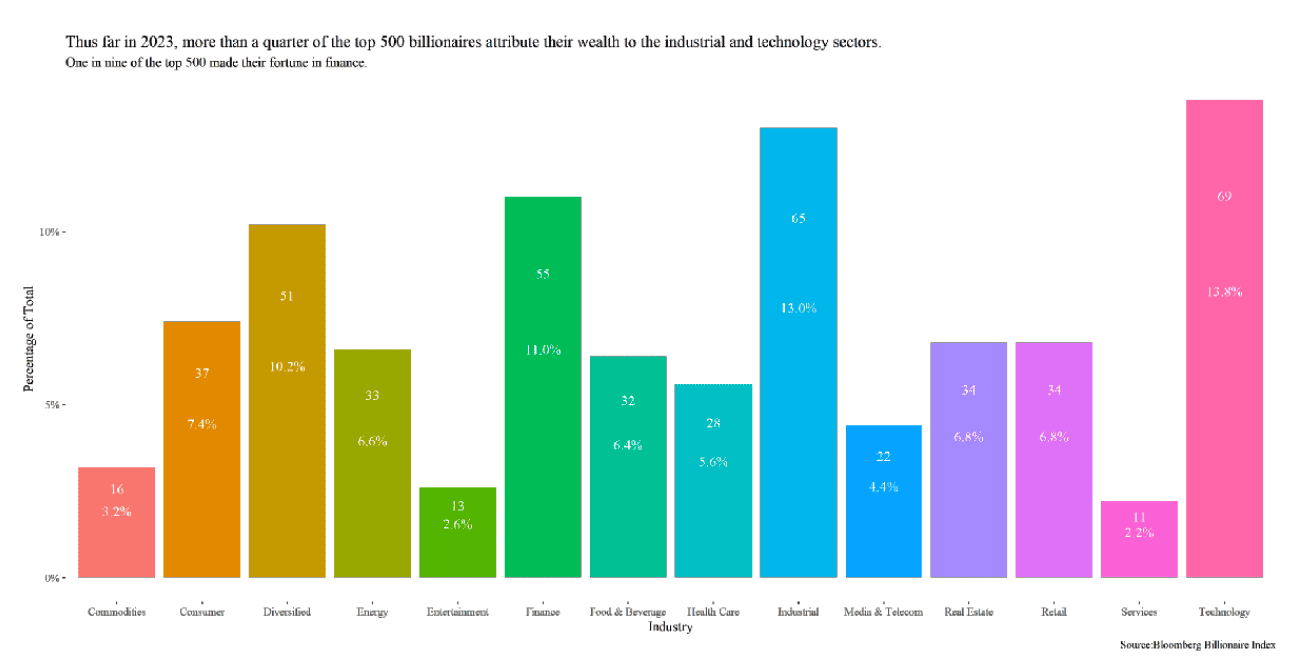Summary
Part Two in a series on the history, present and future of Black billionaires.
When the first Black billionaires emerged, most stemmed from the entertainment industry.
In 2001, Black Entertainment Television cofounder Bob Johnson was the world’s wealthiest Black person with an estimated net worth of $1.6 billion. By 2021, Johnson’s estimated fortune had fallen by more than half – meaning he no longer appeared on annual magazine lists of billionaires the world over. Other Black billionaires did, however – and their profiles mostly reflect Johnson’s, with roots in the entertainment industry.
There were nine Black Americans on the billionaires list in 2021. Two-thirds of them were in the business of entertaining people. These six individuals – Oprah Winfrey, Michael Jordan, Shawn Carter (Jay Z), Tyler Perry, Lebron James and Tiger Woods – are some of the most well-known Black individuals in the world.
Ironically, the most well-known Black billionaires are also the least-wealthy among their Black billionaire peers. The wealthiest African American, Robert Smith, has an estimated net worth of $5 billion in 2021, almost twice that of Oprah Winfrey and Jay Z, who are the wealthiest Black entertainers. Smith’s wealth derived from the financial sector, following in the tradition of the Canadian financier Michael Lee Chin – the other Black man to crack the billionaires list the same year Johnson did. Smith’s private equity firm Vista Equity Partners focused on investing in software companies, an important component of the tech sector – from which the second- and sixth-wealthiest African Americans emerged.
Two Black American billionaires are in tech and the wealthiest of the nine is in finance. The small contingent of Black American billionaires have a very different industry makeup than the top 500 billionaires listed by the magazine Fortune. A plurality of Fortune’s top 500 billionaires made their money in tech, with about 14% of the list. Another 13% are in the industrial sector and 11% come from finance. Only about 3% are in the entertainment field.
There are more billionaires in the United States (735) than anywhere in the world. Though the number of US Black billionaires has increased from one to nine in about 20 years, the rise of the Black billionaire has done nothing to bridge wealth inequality. In 2001, when Johnson and Chin broke the billionaire color barrier, the median wealth of an African American family was about $15,000 according to Dr. Edward Wolff’s research. White median wealth was 10 times that, a little over $150,000. By 2019, median white wealth had risen to $160,000 while Black household wealth had shrunk to $9,000. What had been a 10-to-one median wealth advantage for whites leapt to about 18-to-one in less than two decades.
In the most elite economic grouping, the billionaire class, Black billionaires are only 1% of the billionaires in this country, much smaller than the 13% of the United States population Blacks represent. The racial wealth divide for African Americans is found at every income level: Even the most elite of African Americans, the Black billionaires have little wealth compared to similarly situated white Americans. According to the Forbes 2023 Richest People in America, no African Americans are even in the top 50 wealthiest Americans and several African American billionaires don’t even qualify for the wider Forbes 400 list.

Dedrick Asante-Muhammad is NCRC's Chief of Policy, Research and Equity.
Eddie Gray was an Organizing, Policy and Equity Graduate Intern at NCRC.


